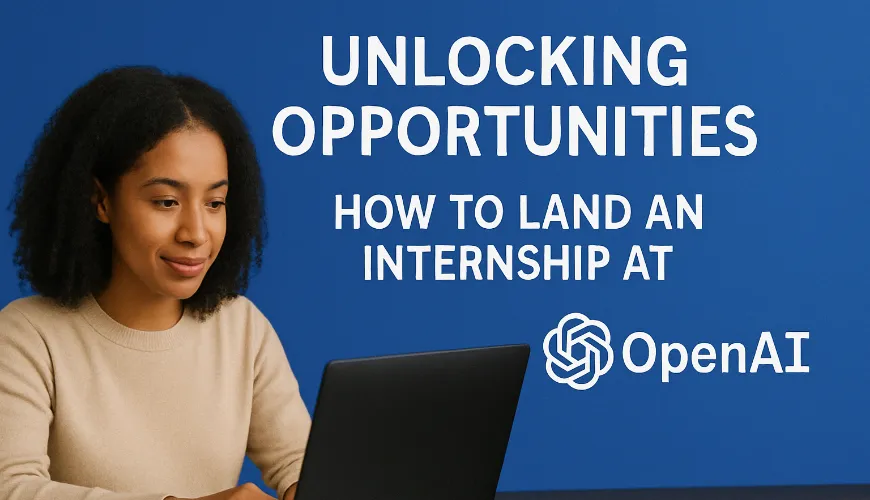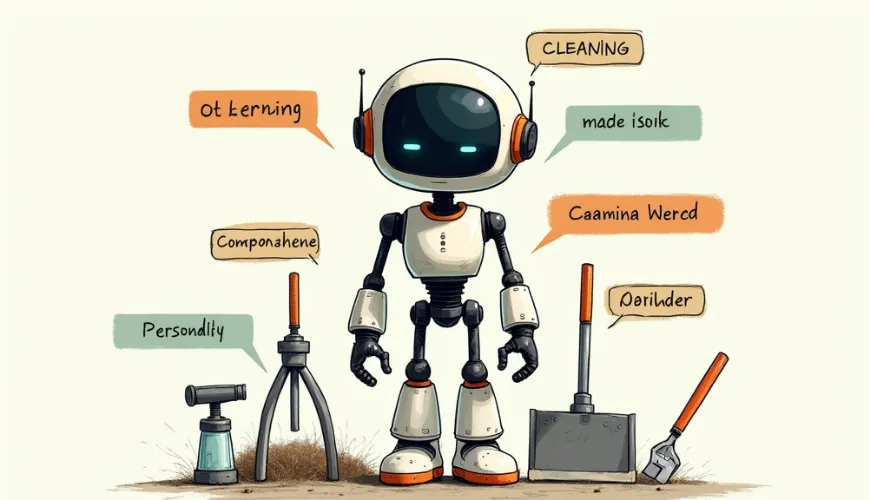Unlocking Opportunities: How to Land an Internship at OpenAI
If you're someone who's ever dreamed of working at the cutting edge of artificial intelligence, an OpenAI internship might just be the stepping stone to your dream career. Whether you're coming from a technical background or have interests in policy, ethics, or communications, OpenAI offers a range of internships that not only look amazing on your resume but also give you the chance to make a real impact.
So, how do you land one of these coveted positions? What does the OpenAI interview process involve? What kind of roles are out there—from engineering to the OpenAI Global Affairs Internship? And how do you even begin to stand out among thousands of applicants?
Let's break it down.
Why Consider an Internship at OpenAI?
OpenAI isn't just another tech company. It's a research and deployment company whose mission is to ensure that artificial general intelligence benefits all of humanity. If you've ever used ChatGPT or heard about GPT-4, you've already seen their impact in action.
An OpenAI internship offers more than a learning experience—it's an opportunity to work directly on projects that shape the future of AI. Interns are treated as full members of the team. You'll get access to world-class mentors, real-world problems, and the kind of challenges that push your skills to new levels.
A few things that make OpenAI internships stand out:
- High-impact work: They don't believe in busy work. Interns contribute to projects that go live.
- Access to top talent: You'll be working alongside some of the smartest people in AI research and policy.
- Supportive environment: The company is known for its collaborative culture and focus on learning.
And yes, interns are paid competitively, with benefits that include relocation support for those moving to the San Francisco Bay Area.
Types of OpenAI Internships
Depending on your area of interest, OpenAI has multiple internship tracks.
Technical Research Internship
This is ideal for students deeply involved in machine learning, computer science, or related fields. You'll work on projects involving neural networks, reinforcement learning, and high-performance computing.
Interns often contribute to cutting-edge work like scaling laws for neural networks or safety mechanisms for alignment.
Engineering Internship
Not all interns at OpenAI are researchers. The engineering team plays a critical role in building infrastructure, designing APIs, and implementing the backbone of tools like ChatGPT.
If you've got experience with distributed systems, performance optimization, or full-stack development, this could be your path.
OpenAI Global Affairs Internship
This lesser-known but growing opportunity focuses on the intersection of AI, ethics, policy, and public engagement. If you're studying international relations, philosophy, law, or political science, this internship is a phenomenal gateway into AI policy work.
Global Affairs interns may help draft policy recommendations, engage with international organizations, or assist in discussions around AI governance.
Communications and Operations
OpenAI also occasionally offers internships in areas like communications, business strategy, and community relations. These roles are essential in helping the organization scale its impact and communicate its mission to the world.
The OpenAI Interview Process: What to Expect
Now, let's talk about the part that most people stress over—the OpenAI interview process. It's thorough, but not impossible to crack if you prepare right.
Step-by-Step Overview
-
Application Submission Start by applying on the OpenAI Careers page. Make sure your resume is tailored to the role, and always include a detailed cover letter that explains why you're passionate about OpenAI's mission.
-
Initial Screening If your application stands out, you'll likely hear from a recruiter. This is often a casual conversation to understand your background, interests, and availability.
-
Technical or Functional Interviews Depending on the role, you may have to complete coding tasks, system design challenges, or research proposals. For non-technical roles, expect scenario-based questions and case studies.
-
Final Rounds with Team Members This is usually a set of interviews with the team you'd potentially join. They want to see how you think, communicate, and align with OpenAI's culture.
The process can take anywhere from 2 to 6 weeks, so patience is essential. Transparency and communication are key. If you need accommodations, don't hesitate to ask.
Tips to Improve Your Chances
Getting an internship at OpenAI is competitive, but not out of reach if you prep strategically. Here are a few tried-and-tested tips:
If you're hoping to make your mark at OpenAI, it's not just about having strong technical skills—it's about caring deeply about how artificial intelligence shapes society. They're looking for people who think critically about AI's broader implications, not just how to code the next algorithm.
One great way to stand out is by contributing to open-source AI projects. These contributions don't just highlight your technical abilities—they give future interviewers something concrete to explore and discuss. It's your chance to show initiative and a collaborative mindset.
Another smart move? Get involved in the AI community. Whether you're chiming in on Reddit threads, exchanging ideas on OpenAI's forums, or publishing blog posts on Medium or LinkedIn, these are all excellent ways to show your passion—and maybe even get noticed by the right people.
Of course, having a solid portfolio is key. A well-organized GitHub profile, published research papers, or even a consistently updated tech blog can go a long way. Real work always speaks louder than a resume.
And don't forget to prep for interviews like a pro. Practicing with tools like Pramp or Interviewing.io can help you simulate technical interviews and get comfortable under pressure. It's a low-risk way to fine-tune your responses before the real deal.
Real-Life Example: A Former Intern's Journey
Take the story of Sarah, a grad student in cognitive science who landed the OpenAI Global Affairs Internship. She had no deep coding background but wrote extensively on AI ethics and had done internships with policy think tanks.
She applied with a customized cover letter explaining her interest in AI governance, submitted writing samples on algorithmic bias, and reached out to current OpenAI employees via LinkedIn to learn more about the organization.
After three rounds of interviews—one of which involved drafting a policy proposal—she was accepted. Her work eventually contributed to a white paper on international AI collaboration.
What is the OpenAI Residency Program?
If you're not quite ready for a full internship—or looking for a deeper, more immersive experience—the OpenAI Residency could be a perfect fit.
This isn't a traditional internship, but more like a fast-track transition for people from adjacent fields (like neuroscience, physics, or math) into AI research. Residents spend time learning foundational skills before collaborating on real projects.
It's a great option for recent grads or career-switchers who have the potential but need the right environment to grow.
Where to Find OpenAI Careers and Internship Listings
The best place to start is the OpenAI Careers page. Roles are updated regularly, and you can filter for internships, residencies, and full-time positions.
Other platforms to watch:
- LinkedIn: Many OpenAI employees share job postings and updates.
- Twitter/X: Follow OpenAI and key team members for announcements.
- GitHub Careers Page: If you're contributing to AI projects, this can also be a good place to spot opportunities.
What OpenAI Looks for in Internship Applicants
OpenAI has a unique culture. They look for people who are not only brilliant but also humble, curious, and collaborative.
Some traits they emphasize:
- Passion for AI and its societal impact
- Ability to work independently and take initiative
- Clarity in written and verbal communication
- Willingness to learn and adapt quickly
- Respect for differing opinions and diverse perspectives
You don't have to be an AI wizard from day one, but you do need to show potential and a strong desire to grow.
Frequently Asked Questions
Do I need to be based in the U.S. to intern at OpenAI?
Not necessarily. While many internships are based in the U.S., especially in San Francisco, OpenAI supports relocation when needed. Some roles may allow remote work depending on the team.
Are internships open to undergraduates?
Yes, though most interns are advanced undergrads, grad students, or early-career professionals. The more relevant experience you have, the better.
How long do internships last?
Typically, internships run for 12-16 weeks, often during the summer. However, some flexible roles may start during other times of the year.
Is the internship paid?
Yes, and quite competitively. Interns also receive benefits like housing support and travel stipends.
One Final Thought
Landing an OpenAI internship is no small feat, but with the right preparation and mindset, it's absolutely possible. Whether you're applying for a technical role, the OpenAI Global Affairs Internship, or exploring the OpenAI Residency, you'll be joining a community of innovators working to build a better future through AI.
Start now—update your resume, write that tailored cover letter, and don't be afraid to aim high. The future of AI is being built today, and there's no reason you can't be a part of it.



